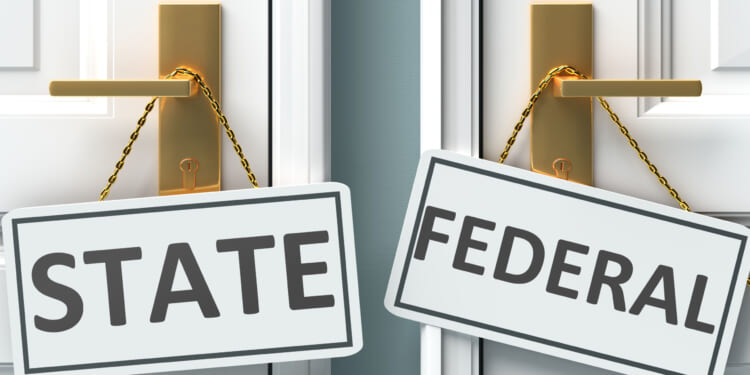As the federal debt approaches $38 trillion, the federal government is shut down, and some states are asking whether it might be time to get control of their dependence on federal funding and declare a greater level of independence.
“Federalism” is the foundation of our system of government, establishing a multi-layered approach to divided and shared governance between the national government and state governments. Over the course of American history, we’ve gone from clearly defined limits on power between the national and state governments to less defined boundaries, with each level of government staying in its own lane, to boundaries that are far more porous. The national government is exerting greater authority, mainly due to its role as a funder of many operations.
A recent policy brief from the Center for Practical Federalism effectively illustrates this dependence. According to this analysis of federal funding sources in state budgets, every one of the 50 states relies on federal dollars for at least a quarter of its budget; Louisiana depends on federal funding for over half of its budget. Nebraska’s dependence ranks in the top 25, with the state relying on federal dollars for 38.5% of its budget.
Federal dollars come with strings attached, following the cynical take on the Golden Rule: “Those who have the gold, make the rules.” The logical corollary to that, of course, is that the more you depend on the gold, the more rules you must follow.
Nebraska has begun the process of reducing its reliance on federal funding and obligations to federal regulations, while also streamlining its own regulatory system to improve the daily welfare of its citizens.
In 2024 and 2025, we passed bills which:
- Ended Judicial Deference, ensuring individuals bringing challenges to agency determinations don’t have the deck stacked against them when going to court.
- Codified regular reviews of all state regulations, to ensure that those things on the books were doing what they were intended to do, and that rules don’t conflict with one another.
- Enacted a Federal Funds Inventory, which requires state agencies to define federal funds received and obligations imposed by those funds. It also mandates the agencies to develop a plan for how the state would respond if those funds were to vanish, because with a high debt rate, it seems increasingly likely that the national government will, at some point, need to reduce the flow of funds to the states.
The good news is that Nebraska’s efforts, all priorities of the Platte Institute, have resulted in a substantial comparative improvement in our rankings. In the 2024 Federalism Scorecard, Nebraska ranked 35th on the “least vulnerable to federal agency and influence” scale. In the 2025 Federalism Scorecard, we jumped to 12th place, surpassing all our neighboring states.
In 2026 and beyond, the Platte Institute will continue to promote efforts that will reduce state reliance on federal dollars and ease the regulatory burden on our citizens and their efforts to help Nebraska grow economically.











